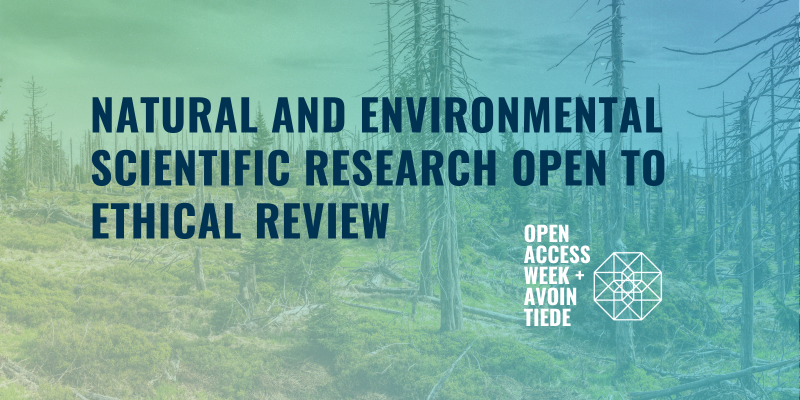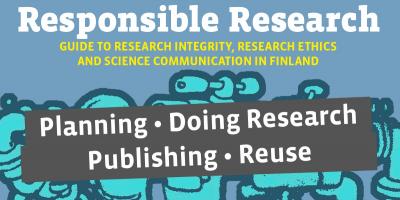Ethical review is part of comprehensive and proactive research integrity, the aim of which is to anticipate ethical problems and risks.
Some research in human sciences must be subjected to a specific ethical review and risk assessment before it is launched. Then, an ethical review must be made for the research; the ethical review has to be carried out in accordance with the guidelines issued by the Finnish National Board on Research Integrity TENK. Only once a positive statement has been received from a human sciences ethics committee can researchers start to conduct their research in practice.
Ethical review takes place before the research begins. Thus, ethical review is part of comprehensive and proactive research integrity, the aim of which is to predict ethical problems and risks. Research carried out in accordance with ethical principles and responsible conduct of research is also high-quality and reliable research, and, as such, an important part of responsible science.
Ethical review is part of comprehensive and proactive research integrity.
The ethics committee conducting the review is not a body that applies strict inspection to narrow down opportunities for conducting research, but instead serves and supports researchers in ensuring the quality of their research plan from the point of view of ethics and avoiding risks.
TENK’s guidelines impose obligations based on commitment
In 2009, TENK issued its first guidelines on the ethical principles of research in the humanities and social and behavioural sciences as well as a proposal for ethical review in these fields. The proposal included a recommendation to establish ethics committees in the human sciences, tasked with issuing ethical review statements. The committees may be established by field or by region, but generally they are set up per each research organisation. If desired, the research organisation may also define other tasks to the committee.
Unlike the Medical Research Act, which regulates ethical review of medical research, TENK’s guidelines is not part of legislation. The obligation to comply with the guidelines arises from the fact that Finnish science and research organisations are committed to do so. Almost all the higher education institutions, research institutions and archives operating in these scientific fields in Finland have signed up to the guidelines.
In practice, the rector or head of the institution signs a letter of commitment on behalf of their organisation and appoints a human sciences ethics committee for a term of 2–4 years, depending on the research organisation concerned.
Human sciences ethics committees serve researchers
In practice, ethical review of research is conducted by human sciences ethics committees, which are part of the support service for researchers. Because some research cannot be started before a positive statement has been received, this service is important and responsible, since if ethical review is delayed, so is the research.
Increasingly today, a body – publisher, funding body, collaborative party – may require ethical review even if the criteria defined by TENK do not.
Increasingly today, a body – publisher, funding body, collaborative party – may require ethical review even if the criteria defined by TENK do not. Even then, the committee provides a service, so that the researcher is ultimately able to make the results of their research public, the final barrier to receiving funding can be overcome, and THE collaborative partners are convinced that the research is being conducted in accordance with ethical rules and principles in every respect.
In universities, the multi-disciplinary membership of committees comprises representatives of as wide-ranging a number of the university’s scientific fields as possible, researchers at different stages of their career and often also other experts (e.g. a lawyer, data protection expert). Ethical issues in research always require separate consideration, which demands both knowledge and experience of the special features of different fields of research.
The committees’ secretaries and members also have a role to play in spreading awareness of research integrity in their community.
Ethical review is based on ethical principles
When research involves people as test subjects or research participants, the principles that can be restored to universal human rights and respect for human dignity are respected: respecting the right to autonomy of the research participants, avoiding harm and protecting privacy.
There are concrete ways of implementing these principles, such as asking the research participants for informed consent to participate in the research. This ensures that autonomy is safeguarded. The research plan and the information given to the research participant must include explicitly written details of what will happen to the research participant during the research and how it will be ensured that harm is avoided. Furthermore, a careful plan must be in place regarding how the personal data gathered about the research participant will be processed and the research participant must also be informed of this. It must also be ensured that the participant’s privacy is maintained.
The task of the committee is to review all these documents and assess whether the research project complies with the ethical principles in accordance with the plan. It is worth remembering that a positive statement from the committee is not a research permit and that ethical review does not transfer responsibility from the researcher to the committee; the researcher is always responsible for their research themselves and for potential risks arising from it. This is especially emphasised if the research is not carried out in the way it was described in the request for a statement submitted to the committee.
Seeking good practice: instructions and communication
A request for a statement on the basis of which THE review is carried out at the committee’s meeting, contains several annexes and completing one takes care and attention to detail. If there is information missing in the request, sometimes there will need to be a great deal of discussion with the researcher regarding the deficiencies identified by the committee. These must be corrected in accordance with THE instructions provided by the committee, before a positive statement can be written.
It is THEREFORE fair to give researchers as good and detailed instructions as possible so that they are able to draw up a request for a statement on the basis of which a statement can be issued without further discussion. This means that the researchers spend less time applying for an ethical review statement and are correspondingly able to focus more on their main task of research.
High-quality research cannot be conducted without it being ethically reliable at the same time.
The busiest committees deal with more than 90 requests for a statement at eleven meetings yearly, so good instructions and well-written requests also mean a prompt service at the request processing stage.
In recent years, data protection legislation has also posed a challenge for ethics committees. Because part of the request for a statement involves obligatory documents regarding data protection, the ethics committee’s expertise must also cover data protection legislation. Many ethics committees have a data protection expert or a lawyer either as a member or as an expert for this reason.
A human sciences ethics committee gives advice, help and guidance
Ethical review is not a separate bureaucratic decoration stuck on top, but an organic part of ensuring that research is conducted in a way that it does not cause risks or harm to any party – not to those involved in the research as participants or test subjects, nor to the researcher themselves. High-quality research cannot be conducted without it being ethically reliable at the same time. The task of the committee is to use their own expertise to ensure this for the researcher.
Raija Oikari, PhD, is a specialist in research integrity at the University of Jyväskylä.
You might also be interested in
Tämä teos on lisensoitu Creative Commons Nimeä 4.0 Kansainvälinen -lisenssillä. Detta verk är licensierat under en Creative Commons Erkännande 4.0 Licens. This work is licensed under a Creative Commons Attribution 4.0 International license.


